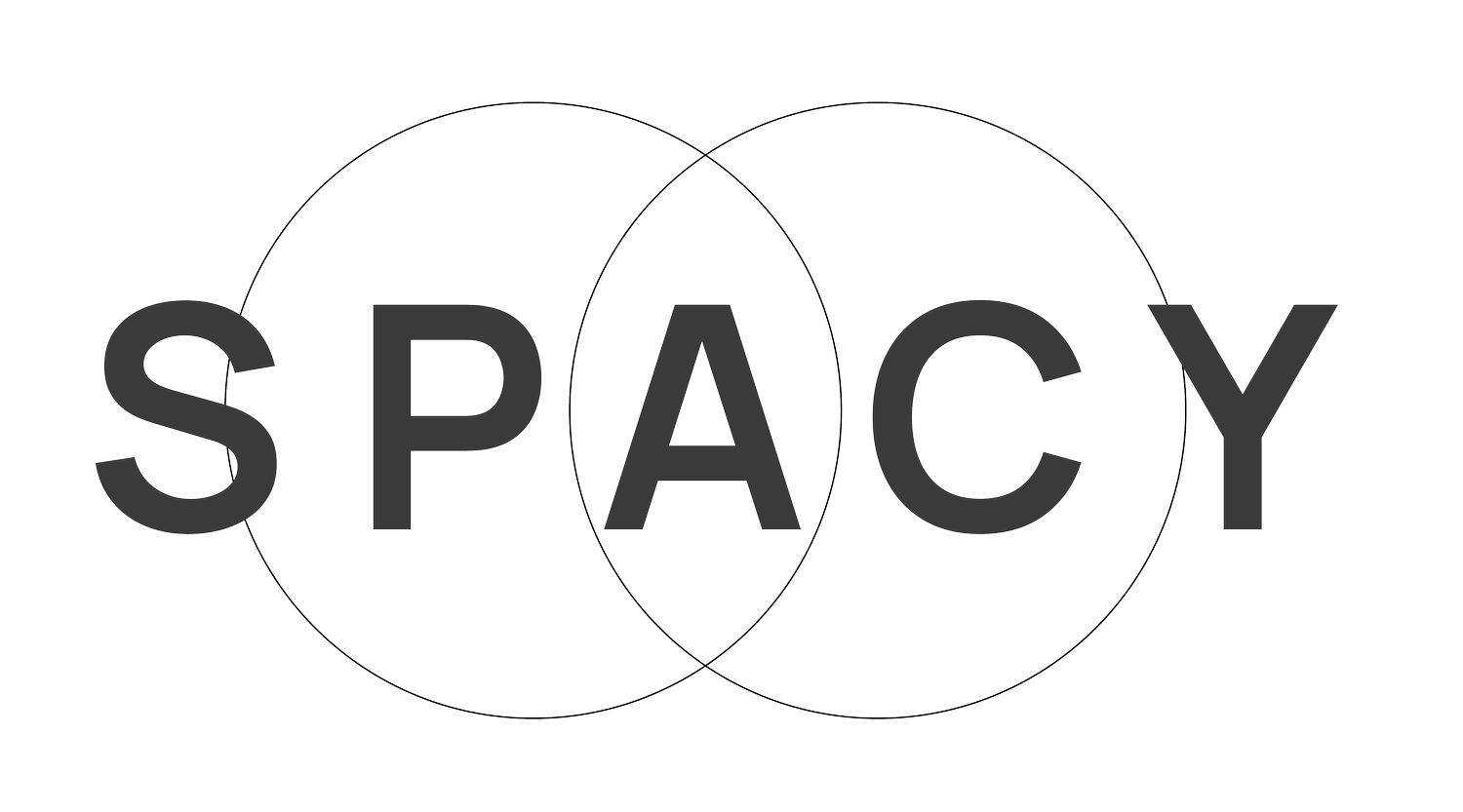
Fragrance Swap
New year, new perfumes. Come with all your samples, full bottles, and more to trade/buy/swap! No perfume to bring? No problem! Come sniff and hang out with fragrance freaks and experience perfumes you can’t get anywhere else. Free event!
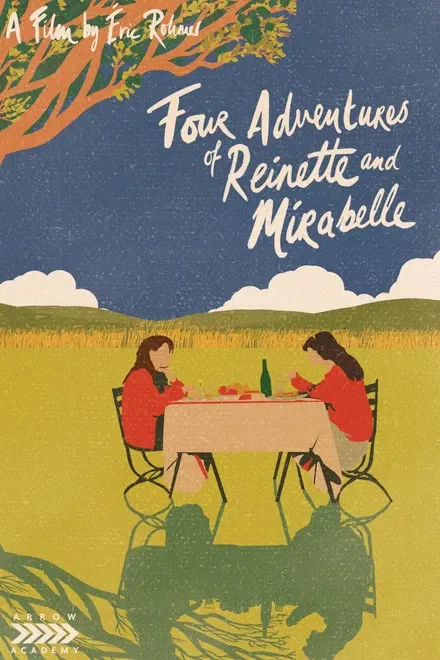
NEW TIME: Rohmer '87: Four Adventures of Reinette and Mirabelle
In 1987, a 67-year-old Eric Rohmer wrote and directed two feature films, Boyfriends and Girlfriends and Four Adventures of Reinette and Mirabelle. Decades removed from his explosion into the European film canon as the last gasp of French New Wave, Rohmer’s ‘87 double feature remains one of the greatest examples of late stage artistry.
This January, Spacy will honor the historic year with ROHMER ‘87, a two-night screening event. Tickets to both films individually are on sale for $10, or $15 for admission to both nights. DOUBLE FEATURE TICKETS
Four Adventures of Reinette and Mirabelle: Two unlike girls are going to learn each other's world - lovely countryside and bustling Paris.
Eric Rohmer | 1987 | France | 99 min

NEW DATE: Rohmer '87: Boyfriends and Girlfriends
In 1987, a 67-year-old Eric Rohmer wrote and directed two feature films, Boyfriends and Girlfriends and Four Adventures of Reinette and Mirabelle. Decades removed from his explosion into the European film canon as the last gasp of French New Wave, Rohmer’s ‘87 double feature remains one of the greatest examples of late stage artistry.
This January, Spacy will honor the historic year with ROHMER ‘87, a two-night screening event. Tickets to both films individually are on sale for $10, or $15 for admission to both nights. DOUBLE FEATURE TICKETS
Four Adventures of Reinette and Mirabelle: Two unlike girls are going to learn each other's world - lovely countryside and bustling Paris.
Eric Rohmer | 1987 | France | 99 min
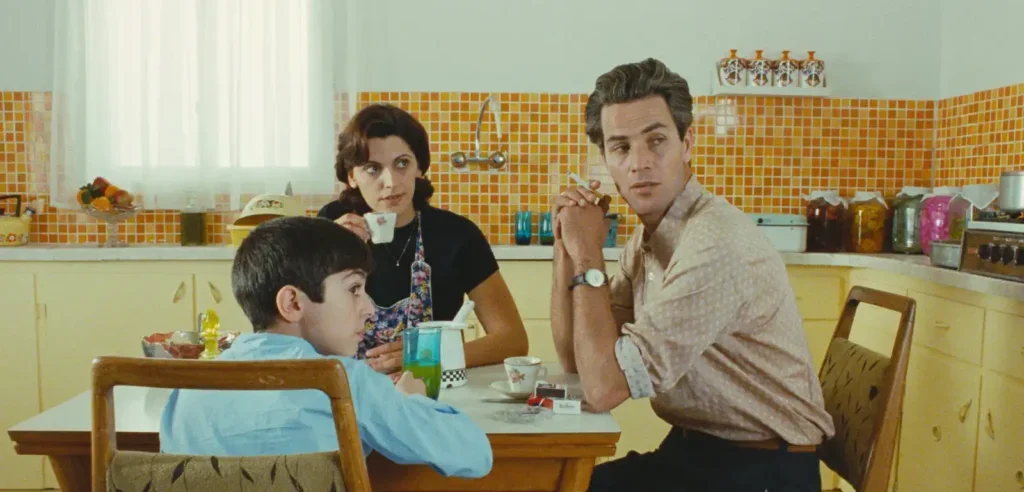
NEW DATE: Two By: The Time That Remains
Free screening but donations encouraged!
Elia Suleiman, 2009, Palestine, 109 min
THE TIME THAT REMAINS: An examination of the creation of the state of Israel in 1948 through to the present day. A semi-biographic film, in four chapters, about a family spanning from 1948 until recent times. Combined with intimate memories of each member, the film attempts to portray the daily life of those Palestinians who remained in their land and were labelled “Israeli-Arabs,” living as a minority in their own homeland.

Volunteer Meetup
Our first ever volunteer meetup is open to all current volunteers and folks who are interested in learning more in the behind the scenes of what makes Spacy so special. We will have pizza and beverages for everyone to come hangout and we’ll show you the ropes of Spacy. If you’d like to learn more of what we’re looking for, check out our volunteers page.
![Toast Toast Recordings Presents: Matthew Devil - Metaphysics of Perversion [live]](https://images.squarespace-cdn.com/content/v1/648012b03544107026d49e12/3106b10b-266e-4e36-89c5-396d21ad407a/IMG_6717.jpg)
Toast Toast Recordings Presents: Matthew Devil - Metaphysics of Perversion [live]
FREE CONCERT!
Matthew Devil: Metaphysics of Perversion [live]
In this live audio-visual performance, Matthew Devil will perform selections from their upcoming album “Metaphysics of Perversion”, to a limited audience in commemoration of its respective release date 2/6/26. The performance has been adapted for the smaller space with a hybrid three-piece ensemble. Toast Toast Recordings will offer physical media which captures the studio recordings of this body of work, available on cassette and compact disc for purchase.
Just before, Adiline Leaf Medley, also of the Toast Toast Recordings roster, will provide opening support with a similar but different approach to ambient music–one that is more guitar forward with fewer lyrics, but just as evocative.
Set times:
Doors: 8:30pm
Adiline Leaf Medley: 9:00pm
Matthew Devil: 9:45pm
BIOS
Adiline Leaf Medley is the atmospheric guitar project of Daniel Mayfield, marrying breakbeats and moments of Southwest guitar licks with cerebral instrumental music.
Matthew Devil is a musician and producer born and raised in the Plano suburbs, and a member of DFW d.i.y.-staple, Steven Leftovers. Sharing traits with the band but diving further into whimsy and elaborate composition, their newest record boasts over an hour of expansive and vivid progressive dream pop tableaus.
“From bedroom pop beginnings, evolving through numerous vaporwave releases under different monikers (as is the style), Matthew Devil’s latest work sees them dropping the mask to wield vast dreamscapes underpinned by the radically confessional heart of a singer-songwriter, all drenched in the hiss and warm fuzz of nostalgia and grief for a future never to be realised.” - Gem Ash, Ambition’s Graveyard, UK.
Matthew Devil will also be performing at Good Records on 1/30/26 prior to the official album release.
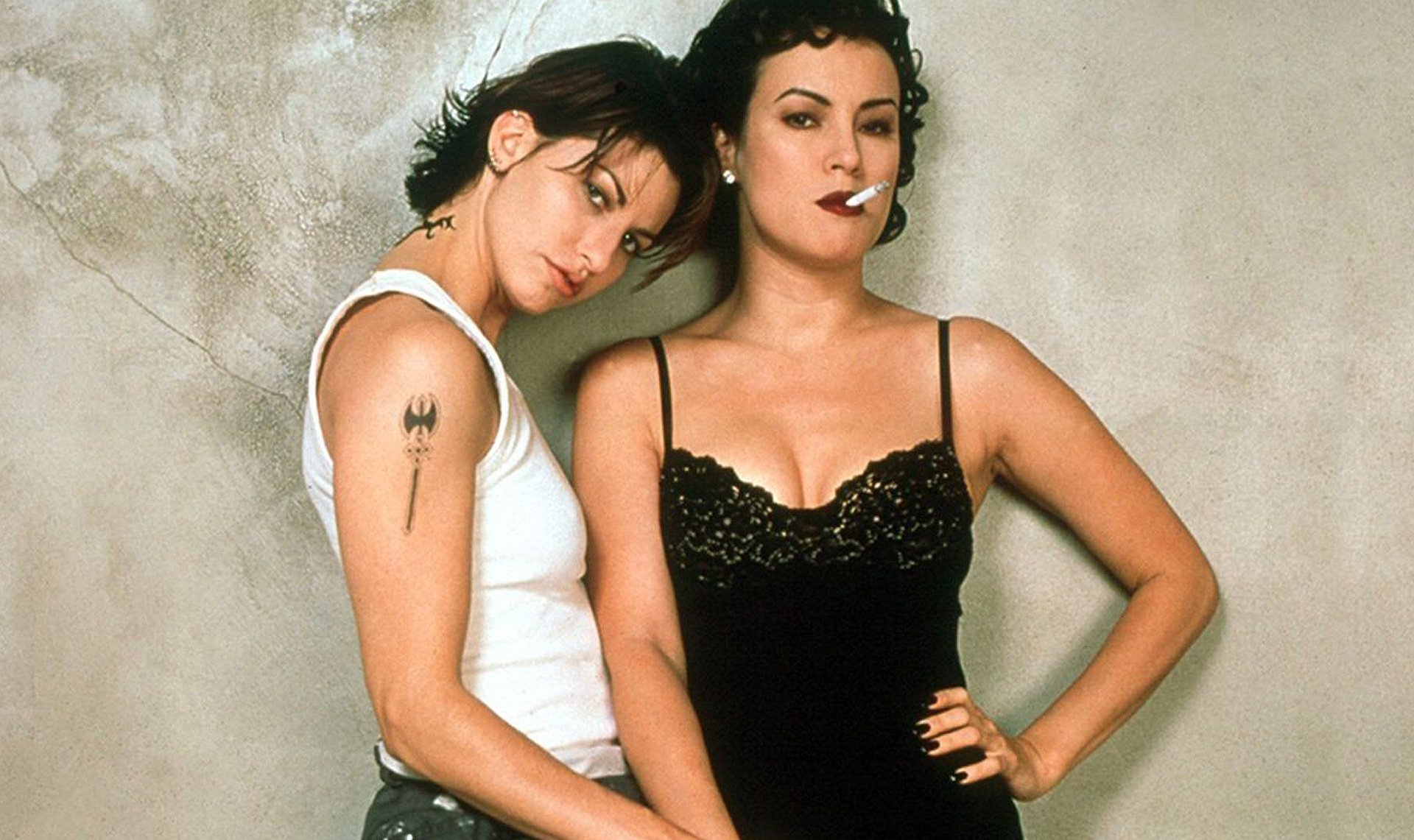
SALA & FTRBC Present: Sapphic Film Club - February Screening (Bound, 1996) & Party
SALA’s (Sapphic and Lesbian Alliance) Sapphic Film Club & FTRBC (For the Record by Claire) presents Leather & Lace Themed Movie Screening & Party featuring the iconic film BOUND! A $12 ticket gets you to the screening, snacks and the party!
Lilly Wachowski & Lana Wachowski, 1996, USA, 105 mins
BOUND (1996) - Intense, erotic crime thriller with Gina Gershon as an ex-con who, after having a sexual liaison with neighbor Jennifer Tilly, joins forces with her to dupe gangster boyfriend Joe Pantoliano out of $2 million of laundered loot. they formulate a plan to rob millions of dollars of stashed mob cash, blaming gangster Caesar for it.
Stay late with us after the screening - enjoy a SALA and For the Record by Claire pop up after party at SPACY inspired by Bound: LEATHER & LACE
Fun costume party - fit inspo will be provided 🖤
Crafts
Sapphic mixer
Agenda:
Doors for mingling, games, market - 5:30pm
Movie Screening - 7pm
DJ & Party - 9:30pm to 11:30pm (or late)
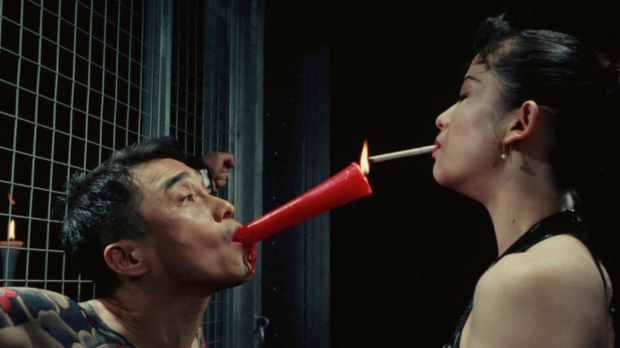
A New Love in Tokyo
Banmei Takahashi, 1994, Japan, 115 mins
Ayumi (Reiko Kataoka) juggles between her work as a call-girl and a life with a boyfriend unable to get into college. Soon, she meets Rei (Sawa Suzuki), a seasoned dominatrix aspiring to become a theatre actor, who spends her free time rehearsing with a troupe that blurring the line between the stage and the bedroom. At the terminus of the Japanese Bubble era, brilliantly evoked here by neon-lit streets and chic interiors, both women bring us into their nocturnal orbit: a life dedicated to the pursuit of pleasure, camaraderie and the joys of hanging out in the thriving, horny districts of Shinjuku and Shibuya.
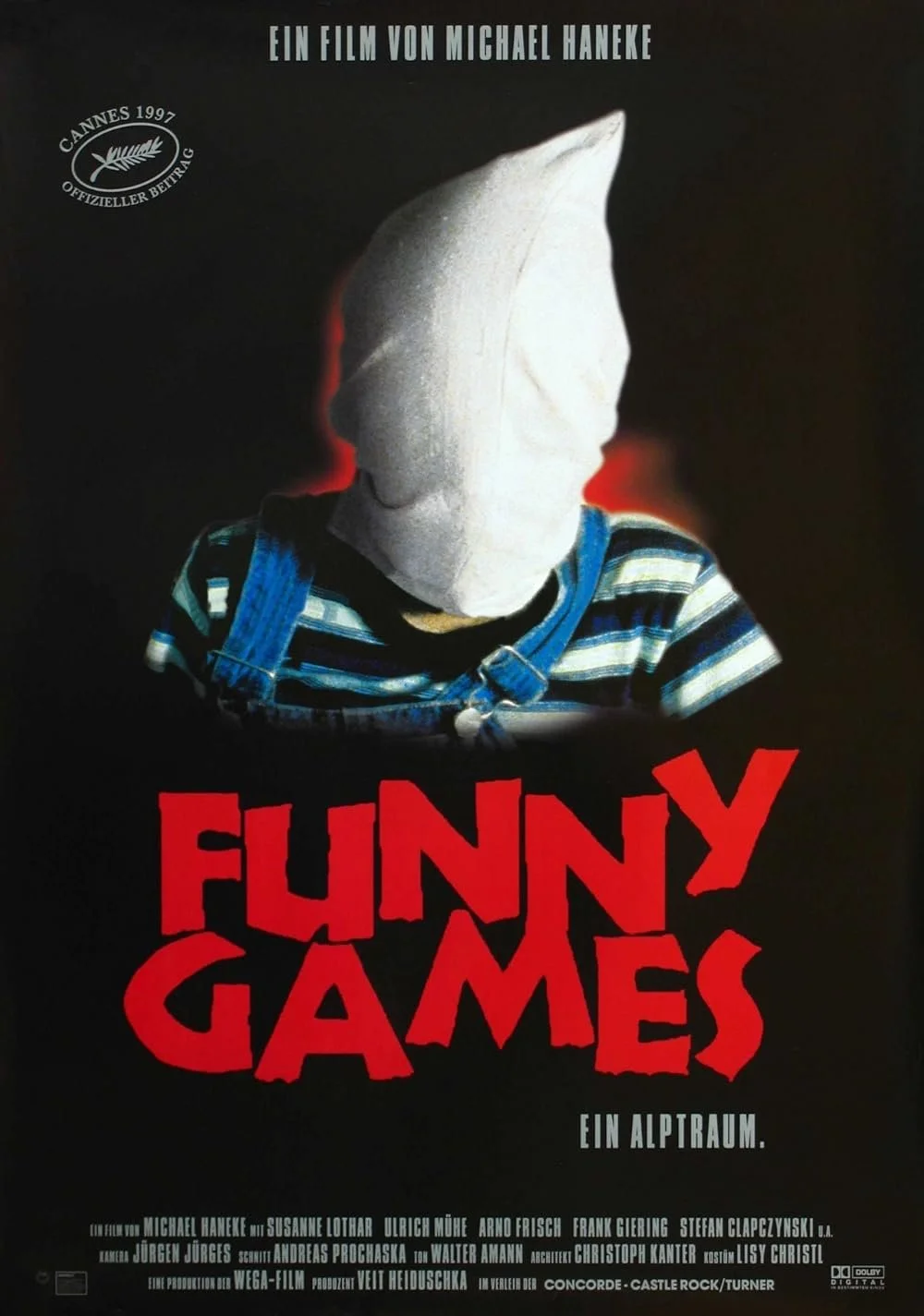
Funny Games | MIDNIGHT MASS
Midnight screening! Free beer from Oak Cliff Brewing Co.
Two violent young men take a mother, father, and son hostage in their vacation cabin and force them to play sadistic "games" with one another for their own amusement.
Screened as part of Spacy’s MIDNIGHT MASS film series.
Michael Haneke | 1997 | Austria | 108 min

Bob Dylan: Don't Look Back
A stunning, intimate portrait of Bob Dylan at the peak of his cultural influence as he completes his 1965 tour of England alongside Joan Baez.
Screened as part of Spacy’s GLIMPSES series, which focuses on documentary films that spotlight the humanity found in the most obscure recesses of society.
D.A. Pennebaker | 1967 | USA | 96 min
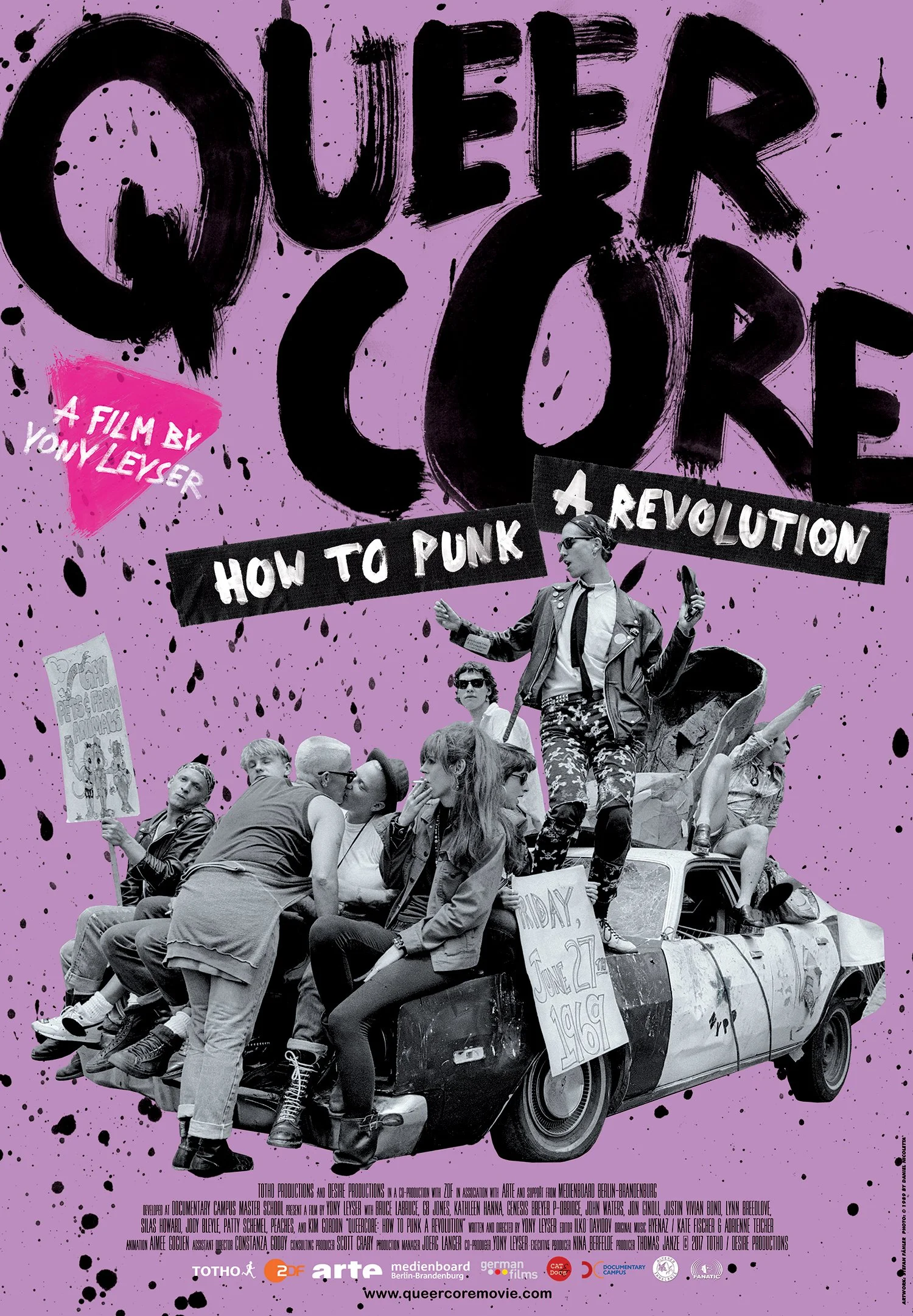
Queercore: How To Punk A Revolution
A documentary on Queercore, the cultural and social movement that began as an offshoot of punk and was distinguished by its discontent with society's disapproval of the gay, bisexual, lesbian and transgender communities.

This Is Not A Film
Facing a 6-year prison sentence and 20-year ban on all further filmmaking, Iranian director Jafar Panahi continues to resist. Shot on an iPhone and smuggled into the Cannes Film Festival on a hidden flash drive, Panahi documents his day-to-day life as he appeals his sentencing and grapples with increasing government threats.
Screened as part of a three-film series at Spacy highlighting Panahi’s work, including 2015’s Taxi and 2018’s Three Faces.
Jafar Panahi | 2011 | Iran | 85 min

Taxi
In this reality-bending experiment, Iranian filmmaker Jafar Panahi poses as a taxi driver and makes. a slice-of-life film about the social challenges in Iran.
Screened as part of a three-film series at Spacy highlighting Panahi’s work, including 2011’s This Is Not A Film and 2018’s Three Faces.
Jafar Panahi | 2015 | Iran | 88 min
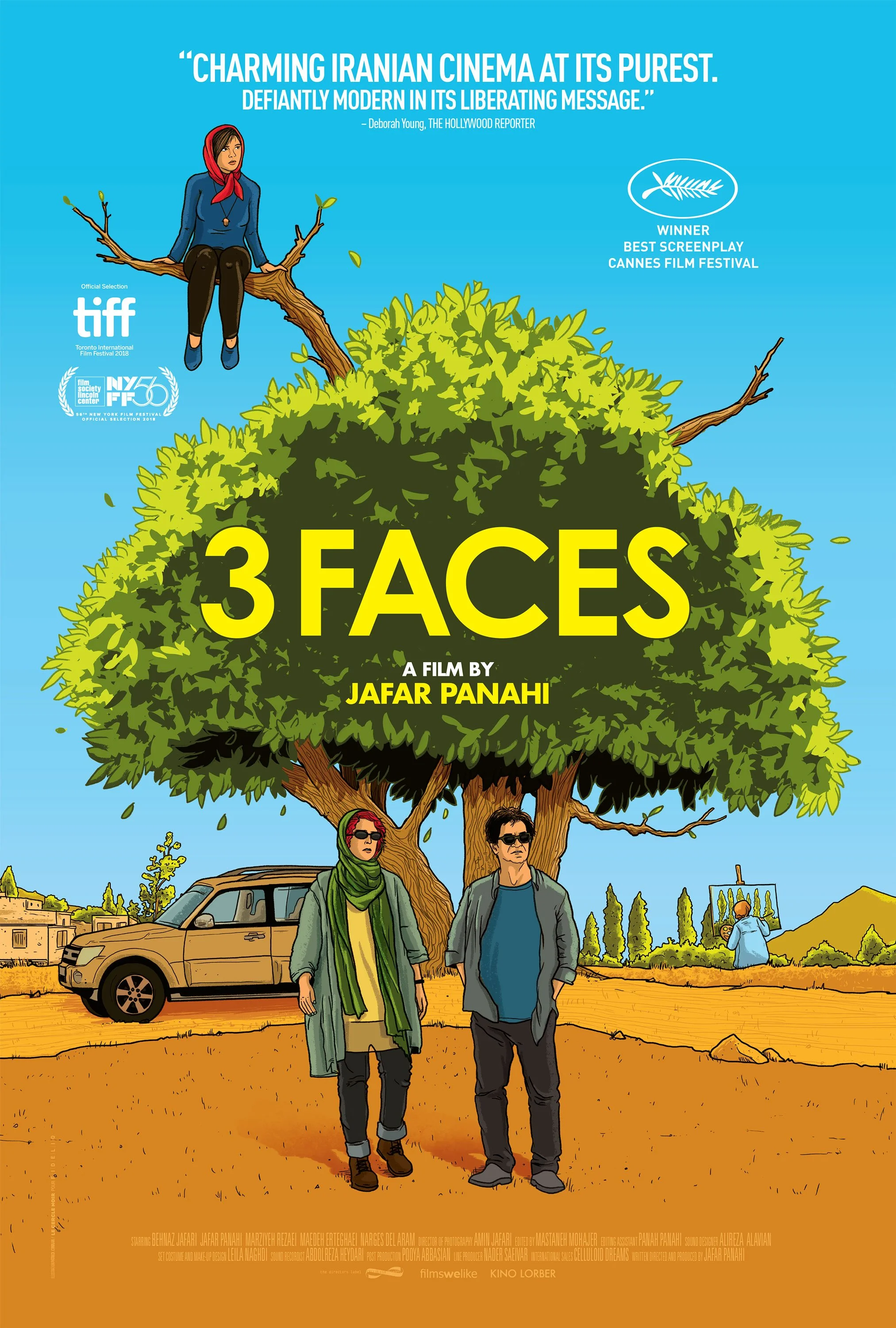
3 Faces
Three actresses at different stages of their career. One from before the 1979 Islamic Revolution, one popular star of today known throughout the country, and a young girl longing to attend a drama conservatory.
Screened as part of a three-film series at Spacy highlighting Panahi’s work, including 2011’s This Is Not A Film and 2018’s Three Faces.
Jafar Panahi | 2018 | Iran | 100 min

Evan Gordon Presents: AJ Goes to the Dog Park
Post-screening virtual Q&A with director Toby Jones!
Toby Jones, 2024, USA, 79 mins
“A downright silly, idiosyncratic, low budget midnight movie that delivers a good dose of offbeat humor” — Louisa Moore, Screen Zealots
In humdrum Fargo, North Dakota, an ordinary man named AJ (AJ Thompson) wakes up on the right side of the bed every day. Content with his mundane existence, his simple routine consists of buttering cinnamon toast for breakfast, eating dinner with his married best friends, and visiting his favorite dog park with his beloved chihuahuas, Diddy and Biff. AJ rejects any interruption to his tranquility, including a promotion at work – offered by his boss who happens to be his dad, but still. Unfortunately, the despotic local mayor has converted his dog park into a “blog park” – where happy dog walkers have been replaced with corporate stooges hunched over their laptops. Thus begins a chain reaction that completely upends AJ’s existence as he trains to embark on an unforgettable odyssey to fight, fish, scrap, scrape and sap things back into place. Toby Jones (Regular Show, OK K.O.! Let’s Be Heroes!) brings the zany, gag-driven joy of cartoons to this surreal, no-budget testament to the average Joe.

Eraserhead | MIDNIGHT MASS
Midnight screening! Free beer from Oak Cliff Brewing Co.
In David Lynch’s 1977 masterpiece, Henry Spencer tries to survive his industrial environment, his angry girlfriend, and the unbearable screams of his newborn mutant child.
Screened as part of Spacy’s MIDNIGHT MASS film series.
David Lynch | 1977 | USA | 89 min
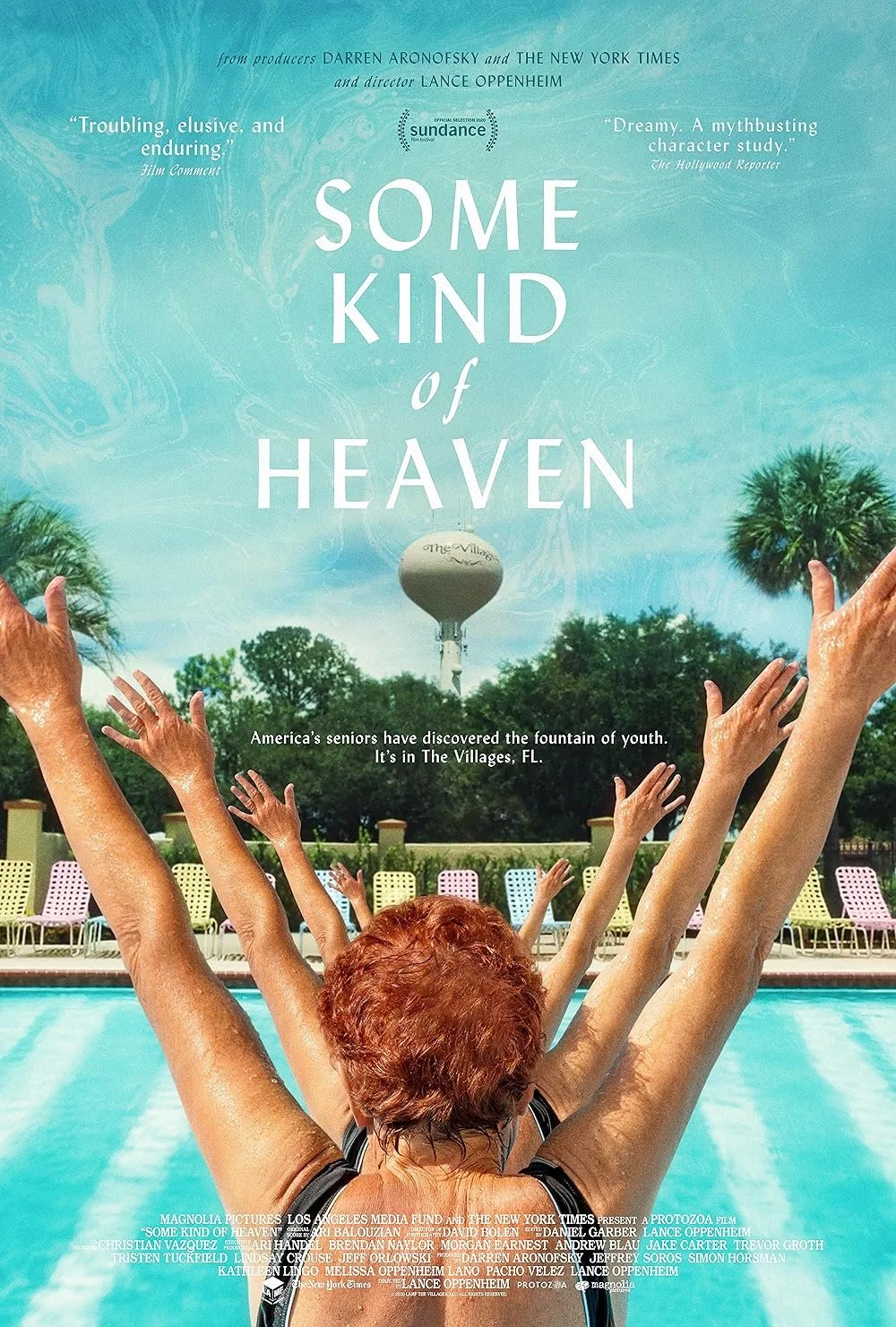
Some Kind Of Heaven | GLIMPSES
Behind the gates of a palm tree-lined fantasyland, four residents of America's largest retirement community, The Villages, FL, strive to find solace and meaning.
Screened as part of Spacy’s GLIMPSES series, which focuses on documentary films that spotlight the humanity found in the most obscure recesses of society.
Lance Oppenheim | 2020 | USA | 81 min
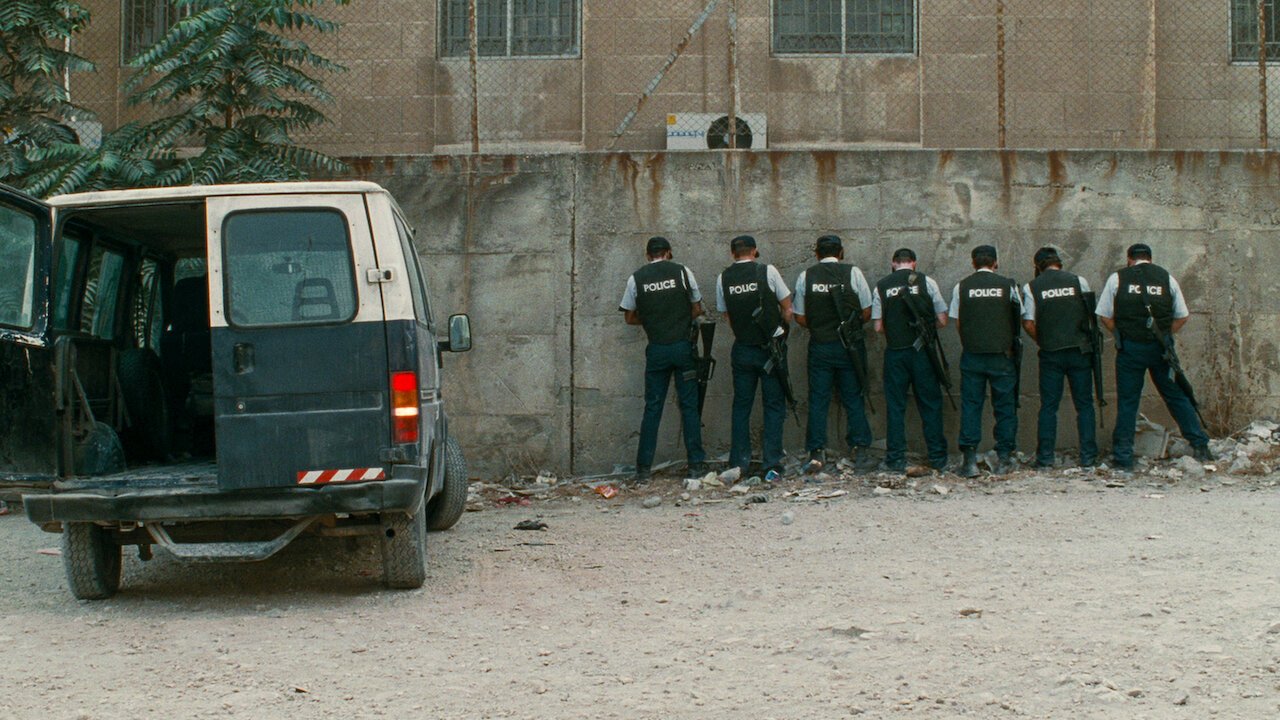
Two By: Chronicle of a Disappearance
Free screening but donations encouraged!
Elia Suleiman, Palestine, 1996, 88 min
After spending more than a decade in New York, Palestinian director Elia Suleiman returned to his homeland in 1992 to make his first feature film. Expectations of what he could do were high: he left the U.S. with an ITVS grant to develop his project and soon won a prize at Locarno for his script. With further backing from a French co-producer, Suleiman was able to complete his film just in time to win the award for best first feature at the 1996 Venice Film Festival.
Chronicle of a Disappearance is an extended meditation of the contemporary life of Palestinians in “the Holy Land.” Elders recount absurdly funny tales and jokes; Russian emigres talk about tourism’s ravaging of the country; tourists pontificate about Israeli politics; and a young Palestinian actress struggles to find an apartment, while Suleiman, himself a character, tries to figure out what kind of film he should make. Suleiman weaves these narratives together with extraordinary irony and grace.

Afternoons Of Solitude
Described as “a masterpiece” by Ari Aster, legendary Spanish director Albert Serra explores the world of bullfighting in a manner that is as colorful as it is carnal.
Screened as part of Spacy’s GLIMPSES series, which focuses on documentary films that spotlight the humanity found in the most obscure recesses of society.
Albert Serra | 2024 | Spain | 125 min
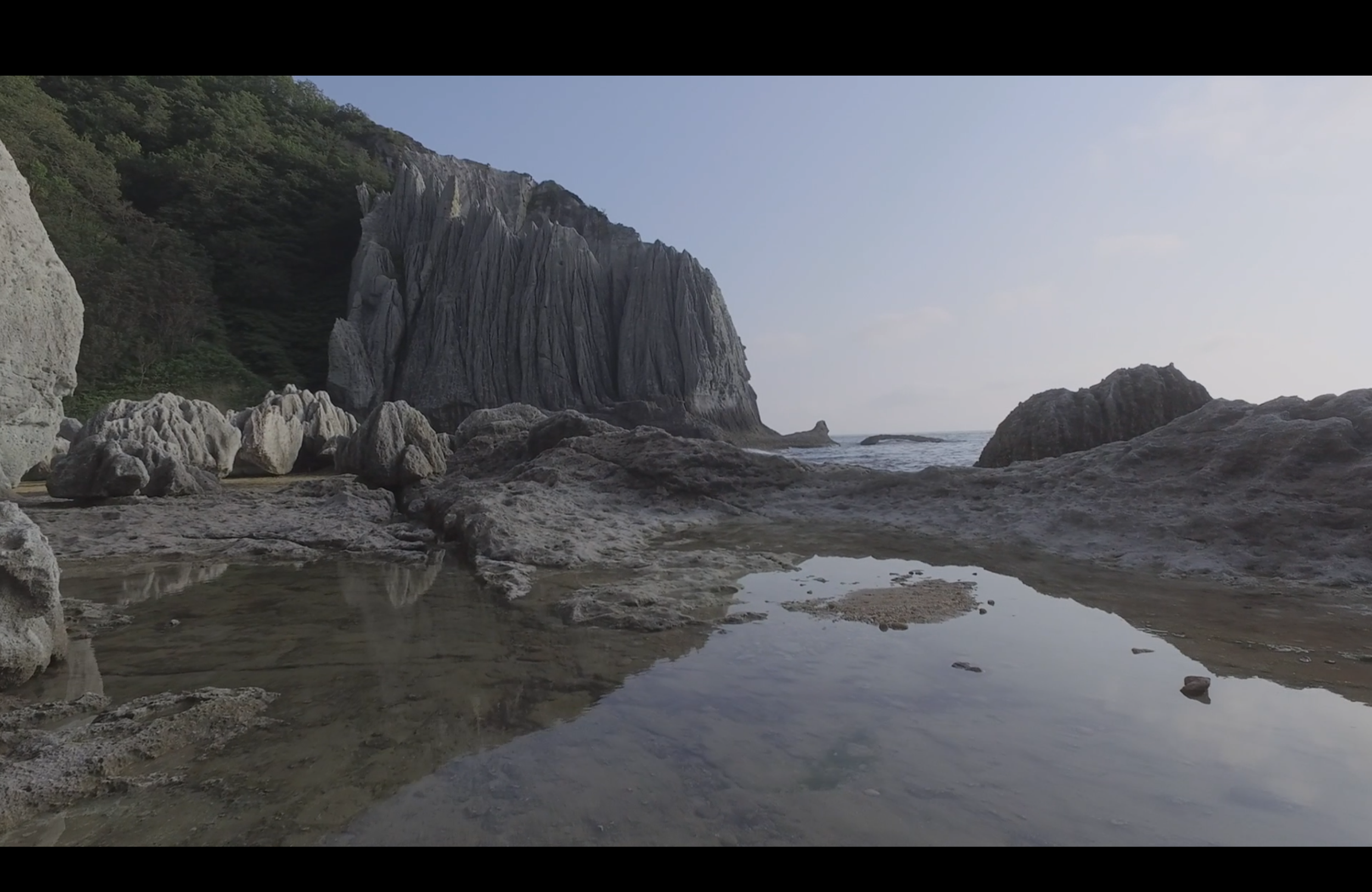
Looking for the Wolf: East Asia Anti-Japan Armed Front
Post-screening Q&A afterwards!
Kim Mirye, 2018, South Korea, 74 min
On August 30th, 1974,a time bomb set by the "Wolf" brigade of the East Asia Anti-Japan Armed Front destroyed the Tokyo Headquarters of Mitsubishi Heavy Industries. "Fangs of the Earth" and "Scorpion" soon followed with more bombings. Unlike other leftist groups at the time that sought to seize the Japanese state to build socialism, the EAAJAF were explicitly opposed to the Japanese nation-state, understanding it as an imperialist power in East Asia and a junior partner to American imperialism.
Over 50 years have passed since the Mitsubishi bombing; some EAAJAF members have passed, others are still incarcerated, and some have been recently released. In the intervening years, a group of friends and family members stepped forward to support their incarcerated loved ones, answering questions about how to provide long-term prisoner support for people incarcerated by the state and condemned by society.
Guiding us through the memory-scape of the EAAJAF movement, this film reflects upon the power and violence of the state, posing questions about responsibility, complicity and solidarity for individual human beings living within the territories of imperial states.
Compelled by the energy of ordinary people,Kim Mirye's work has zoomed in on the experience of exclusion in everyday lives.Her films investigate and uncover historical roots of dehumanization, and on their relation to others and the world. What is it to resist in the heart of empire?
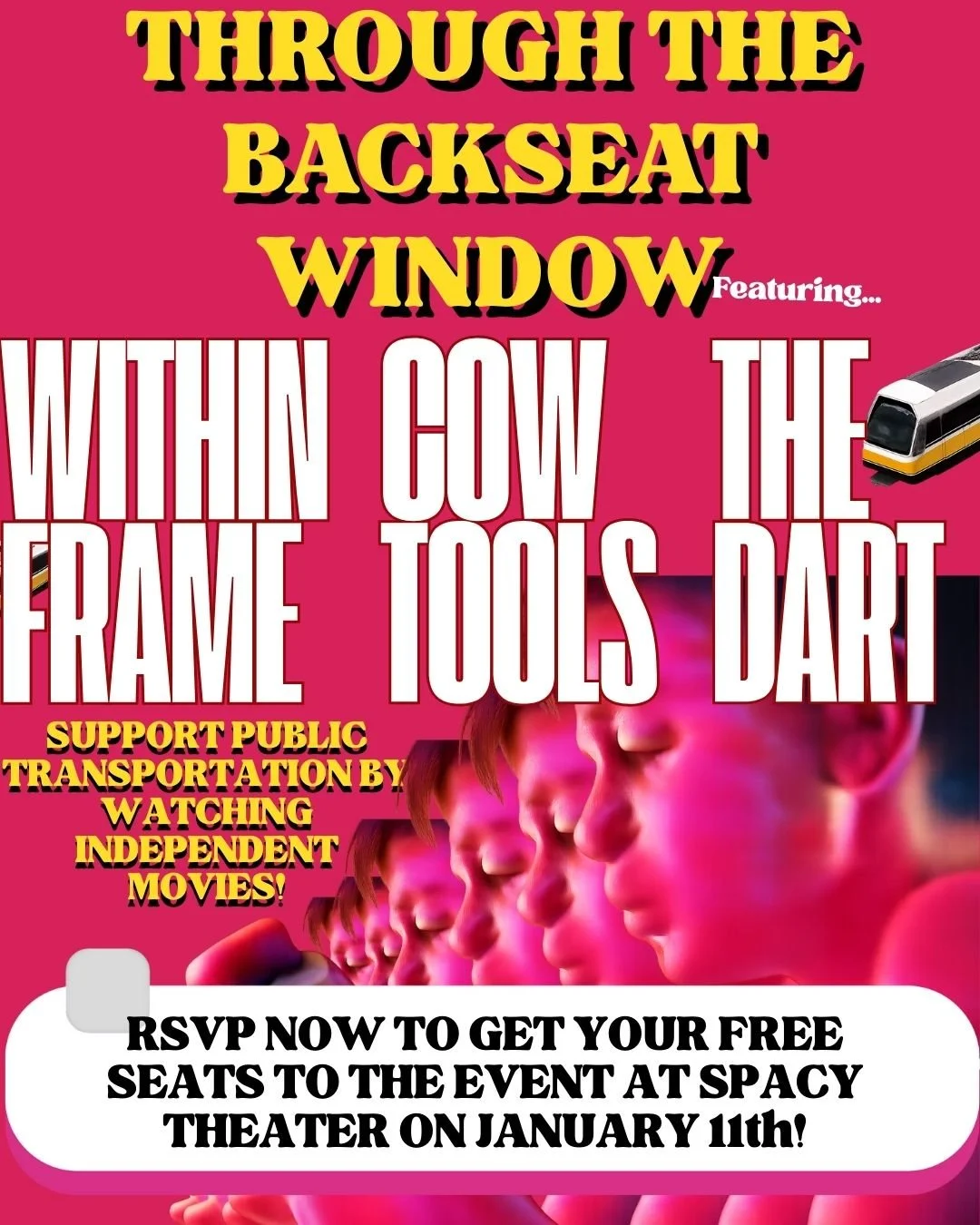
Through the Backseat Window - Benefitting DART
THREE SHORT FILMS, LIVE MUSIC PERFORMANCES AND SPEAKERS - presented by the Dallas Public Transit Society
Block 1: 5:30-7:00 p.m.
Block 2: 7:30-9:00 p.m.
Through the Backseat Window, is meant to connect communities across Dallas with independent films, to counterbalance the dispersion of arts communities caused by extensive urban sprawl throughout the DFW metroplex. As Dallas Public Transit Society (A local organization fighting for public transportation), we’re focused on promoting the growth of public transportation in Dallas as more than a mode of transit, but as a method of connecting communities and minds while developing the societal and cultural norms of Dallas. The presentation title: Through the Backseat Window is in reference to the child-like perspective of the world through the backseat window of a car; full of insight and creativity. Like in any car based city, this perspective of the world becomes diminished by the responsibilities of driving and concerning yourself with your own safety, and your own property. Car based cities innately encourage separation between people, without proper reinforcement of culture or unity, which is what we hope to encourage by bringing people together with this event. We believe that public transportation acts as a continuation of the perspective we all had as kids, looking out the backseat window of a car, wondering how we would someday change the world that we observed. These are independent films made by Dallas filmmakers who use DART (Dallas Area Rapid Transit), and these films are meant to reflect the ideas and insights that these filmmakers have gained, by utilizing DART as not only a mode of transit, but also as a vessel for thought. Our city should not be defined only by its economic growth, but also by its contribution to the societal norms that we practice throughout the nation.
Through the Backseat Window is a screening of three independent films made by local Dallas filmmakers, mutually presenting the artistic initiatives inspired by DART.
The DART
Grimsley Hunter, 2025, USA, 6 min
The first film is titled The DART; a short documentary about our efforts and goals as an organization, with interviews from multiple DART riders and local Dallas citizens who want to see public transit thrive in Dallas.
Cow Tools
Everett Johnson, 2025, USA, 7 min
The second of these films is an independent short film titled Cow Tools which has been described by its film maker as “A strange story about a very special cartoonist” without any further explanation.
Within Frame
Mason Merritt, 2025, USA, 45 min
The third and final film being screened is titled Within Frame which is a surrealist short film depicting a young child who is home bound by various health issues, seeking real life experiences in the world, while another story is being told of a struggling artist, longing for a meditative experience similar to that of the child’s isolation.

Highway Hypnosis | MIDNIGHT MASS
Midnight screening! Free beer from Oak Cliff Brewing Co.
The Los Angeles Freeway Killer (Leonard Lumpkin) takes a drive to Las Vegas—and back. This video by Ken Camp (As the World Burns) is both trancelike and troubling, taking the viewer across the desert of California, through Nevada, and into “the frightening zone where lay the genetic codes and memories that make us all killers.”
Unseen since its 1984 premiere at West Hollywood’s EZTV Video Gallery, Ken Camp’s Highway Hypnosis is a disturbing meditation on the eroticism of violence and a major work of both narrative video art and queer horror.
New digital preservation from the original 3/4” tape master.
Ken Camp | 1984 | USA | 63 min

TAKE BACK YOUR DATA: An Anti-surveillance Accountability Workshop with Paraspace Books
TAKE BACK YOUR DATA: A hands-on anti-surveillance accountability workshop with Paraspace Books. FREE WORKSHOP!
In this workshop led by Paraspace Books (S Rodriguez and Sara Balabanlilar), participants will learn and implement protective measures against online data surveillance in a hands-on environment. We will discuss best practices for cybersecurity using ‘good, better, best methodologies and simplify what can be a daunting process for the casual netizen.
S and Sara will use their own cell phones and laptops as examples as participants set up a VPN, alternate email addresses, online storage systems, and phone numbers. In this workshop, Paraspace will map out ways of navigating different situations requiring users to give out their data in exchange for ‘real life’ and digital services. Bring your computer and phone!
Additional resources (print, USB, and cloud) will be provided at the event and after for those who are not able to attend.
BIOS
Sara Balabanlilar has been a publisher, bookseller, designer, and undercover gallerist. She is the co-founder of queer sci-fi bookshop Paraspace Books. She has spent almost ten years working in the book world, including internationally-focused, award-winning publishers Deep Vellum Publishing and Dalkey Archive Press, and is currently a Senior Sales Specialist at indie publisher Microcosm Publishing.
S Rodriguez is a Texas based interdisciplinary artist, writer, and curator. Their practice is rooted in their unwavering belief toward liberation for all beings, and against oppression. S is the co-founder of Barbee Manshun, a curatorial project focused on democratizing the art gallery and showcasing historically marginalized artists, and of Paraspace Books, an award winning transient queer book shop and workshop project focused on non-canonical sci-fi and speculative futures. They have exhibited and performed at the Contemporary Arts Museum Houston, Diverse Works, the Blaffer Art Museum, the Austin Public Library, the Houston Centerfor Contemporary Craft, Lawndale Arts Center, and more. S is a former Idea Fund Grant recipient, and Common Field Partner.

Underground Intimacy






Underground Intimacy is a program showcasing two films, Shakedown and a_blurred_fluxx_00.avi, tracing the textures and contradictions spaces of Black queer nightlife, kinship, and becoming—examining how community forms and how visibility is negotiated.
Shakedown will play first with a_blurred_fluxx_00.avi proceeding afterwards and be sure to stay afterwards for an in-person Q&A with Osadolor Osawemwenze (director of a_blurred_fluxx_00.avi).
Shakedown
Leilah Weinraub, 2018, USA, 72 min
SHAKEDOWN is the story of Los Angeles’ black lesbian strip club scene and its genesis. Owned and operated by women, underground and illegal in nature, the club Shakedown is the darker, faster, younger iteration of this dance culture. The film is a window into this world. Shakedown emerged from a post-RIOTS, post-OJ, post-integration but still very racially divided Los Angeles. In this divided city Shakedown is an independent, all black and all female cash economy. SHAKEDOWN chronicles the explicit performances and personal relationships of the party’s dancers and organizers including Ronnie-Ron, Shakedown Productions’ creator and emcee; Mahogany, the legendary “mother” of the community; Egypt, their star performer; and Jazmine, the “Queen” of Shakedown.
a_blurred_fluxx_00.avi (Director’s cut)
Osadolor Osawemwenze, 2024, USA, 37 min
Across Dallas, the Bay Area, and New York City, eleven Blackqueer folks engage in layered conversations and candid everyday moments of joy, melancholy, introspection, euphoria, loneliness, and community-in-active-formation. Their complex minds revel in the journey of becoming Blackqueer and exploring their endless coming of age. As an experimental documentary, a_blurred_fluxx_00.avi delves deep into the nuance of today's Blackqueer youth. This dynamic and non-linear supercut provides a carefully crafted audiovisual space for the multiplicity of Blackqueer self-expressions. With a distinct yet nostalgic direction, editing style, and sound design embedded in low-resolution, a_blurred_fluxx_00.avi is a refreshing, necessary, and expansive film beyond time.
ARTIST BIO
Osadolor Osawemwenze is a New York-based director, visual maker, creative researcher, and sound designer born and raised in Dallas, Texas. As a Nigerian American, moments of discovery, reflection, and awareness of his positioning in this world influence their nostalgic Lo-Fi and D-I-Y videos and experimental sonic design. Through audiovisual works, Osadolor creates space to wonder/wander in abstraction, expansion, and fleeting clarity, finding the most inspiration in the multiplicity of herself that is not so clearly defined or categorizable. He recently graduated from Stanford University with an academic focus on the Black Diaspora, pop culture, Blackqueerness, media, art, and aesthetics. Osadolor's latest experimental documentary, a_blurred_fluxx_00.avi, which delves into the nuances of today's Blackqueer youth, was a finalist for Best Documentary (International Short Film) at the 2024 London Breeze Film Festival and has since been screened in various film festivals, theaters, and spaces. In their globally charting podcast, 'a coming of age, but irl,' Osadolor blurs introspection and conversation through uniquely crafted sonic experiences.
![The Patron Saint of Roadkill [SOLD OUT]](https://images.squarespace-cdn.com/content/v1/648012b03544107026d49e12/da346a02-5021-4d00-a568-76f3fb51e1af/Still+2025-06-26+171057_1.44.1-min.png)
The Patron Saint of Roadkill [SOLD OUT]
Live in-person post-screening Q&A with director Arin Spence. $5 admission.
Arin Spence, 2025, USA, 56 min
Andy's bogus job search comes to an end when they accept a mysterious position giving funerals to roadkill.
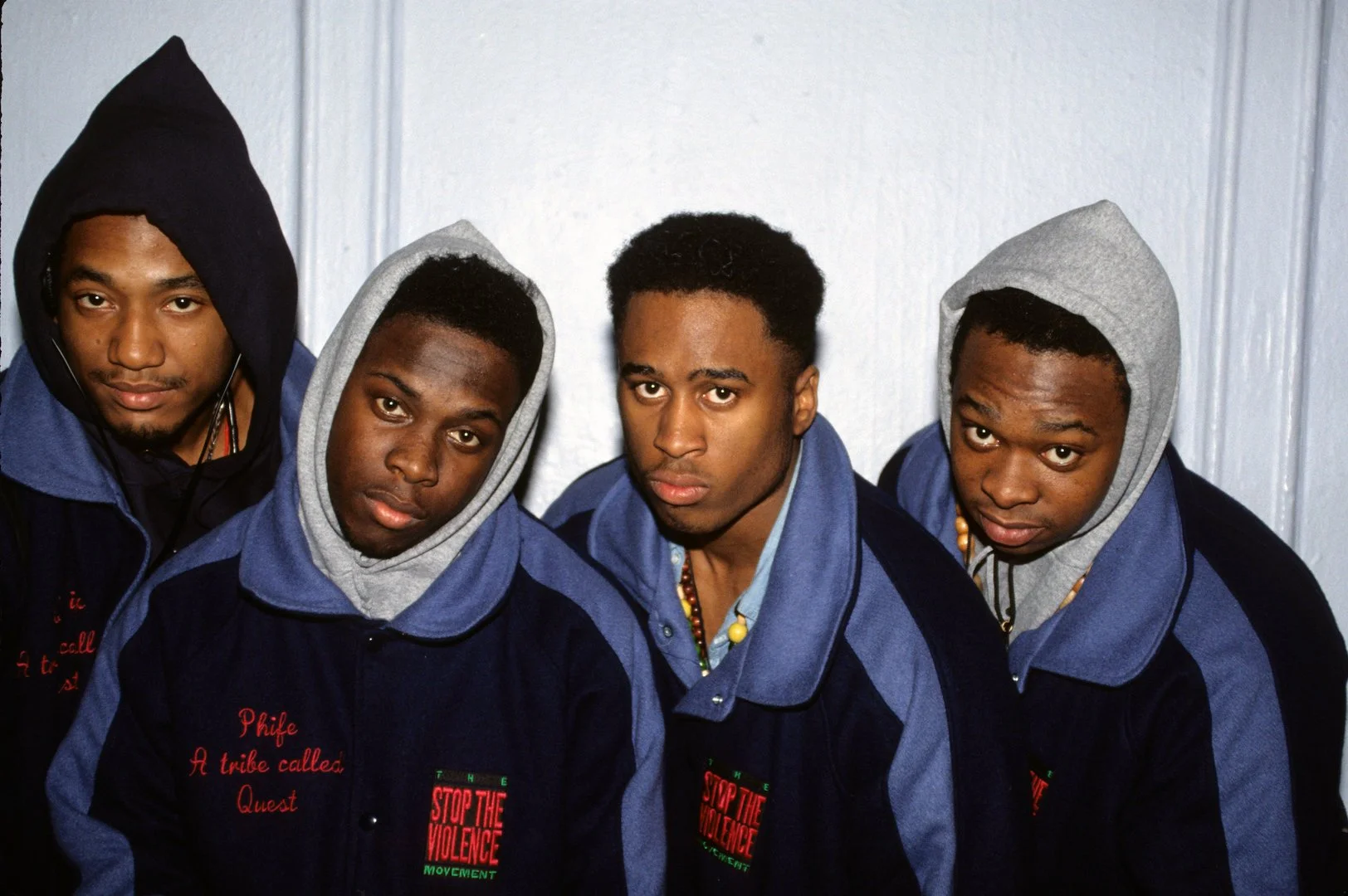
Noname Book Club DFW Presents: Beats, Rhymes & Life: The Travels of A Tribe Called Quest + Live Reading
Free admission but donations strongly encouraged!
Noname Book Club DFW reads black fiction and nonfiction throughout the year, sends books to incarcerated folks, and builds community around reading and literacy. Join the club with a special free screening of "Beats, Rhymes & Life: The Travels of A Tribe Called Quest" in conjunction with a live reading of Hanif Abdurraqib's Go head in the Rain: Notes on a Tribe Called Quest
Michael Rapaport, 2011, USA, 97 mins
A Tribe Called Quest has been one of the most commercial successful and artistically significant musical groups in recent history. The band’s sudden break-up in 1998 shocked the industry and saddened the scores of fans, whose appetite for the group’s innovative musical stylings never seem to diminish. This insightful film, directed by Michael Rapaport, takes viewers on a behind-the-scenes journey - chronicling the group's rise to fame and revealing the stories behind the tensions which erupted in the years to come.

Tu Y/Ojo POV2
Tu Y/Ojo POV2 is the second episode of a series of video works directed and produced by adO/Aptive. The project Tu Y/Ojo ("You and I/Eye") confronts the viewer with their relationship to technologies of image creation and proposes an open and collective way to produce artworks in public space. For each POV (point of view) adO/Aptive calls local people, performers and artists to participate in scripting, acting as well as filming the work.
Tu Y/Ojo was filmed in March 2025 in Klyde Warren Park in Dallas.
Performed and filmed by Benjamin Adams, Sofia Alejandro, Lyzette Amador, Arfa, Alex Curington, Aliyah Cydonia, SooMi Han, Savion Perr, Daniel H. Pineda, Francisco Santillan & Janina Weißengruber. Produced & directed by adO/Aptive (Daniel H. Pineda & Janina Weißengruber). Cut & subtitles by Daniel H. Pineda. With a song by Savion Perr.*
Program order:
Line of Sight, 2024 by Kevin Daryl Ferdinandus
gates of hydra, 2022 by Philipp Pess
Tu Y/Ojo POV2 2025 by adO/Aptive PREMIERE& post-screening Q&A
Tu Y/Ojo POV1 2025 by adO/Aptive
Afterparty with DJ Sets by @nosocial__, @shoggoth_11, @___dissed & @jan.w.e.i.
DM @adoaptive or @spacydtx on IG for afterparty details starting at 10pm!
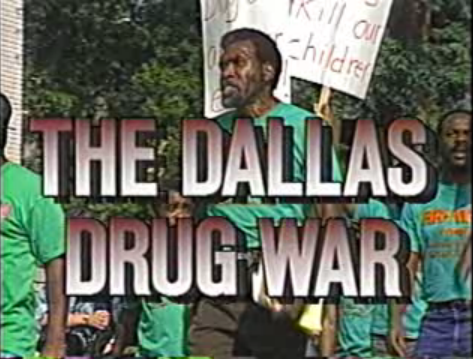
The Holiday Holla: A Day of Action
FREE SCREENING!
Join SERUN Foundation and other affiliated groups including the Stop Cop City Dallas Coalition for a screening of the PBS FRONTLINE 1989 documentary, The Dallas Drug War, followed by a community discussion. Holiday beverages and snacks will be served. Bring a toy to donate to our gift drive for children who currently have loved ones incarcerated or in ICE detention.
PBS, 1989, USA, 56 mins
Frontline correspondent Bob Ray Sanders profiles the struggle of one neighborhood in Dallas, Texas, to combat the drugs and violence that threaten the lives of its citizens and the future of the community.

DSA NTX Presents: Sirens (2022)
Free Screening!
Rita Baghdadi, 2022, Lebanon/US/UK, 80 min
Sirens intimately chronicles the lives and music of Slave to Sirens, a young all-female metal band whose burgeoning fame is set against the backdrop of the Lebanese revolution. Its members wrestle with friendship, sexuality, and destruction as their music serves as a refuge to Beirut’s youth culture. The complicated relationship and subsequent tense fallout of founders Lilas Mayassi and Shery Bechara threatens the very fabric of the band, but an even greater looming threat is Lebanon’s criminalization of homosexuality, and the devastating effects of the country’s political corruption. Yet despite their obvious challenges, the members of Slave to Sirens persist in trying to create a revolution of their own: living their truth.

Universe Synergy: Select Films by Robert Fulton
Robert Fulton, various years, USA, 77 mins (total program)
Spacy is proud to present “Universe Synergy: Select Films by Robert Fulton” which includes four recently restored high definition digital master shorts from aerial cinematographer & experimental filmmaker Robert Fulton. Fulton approached filmmaking as an act of perception rather than representation. His works translate the precision of physical practice, the rhythms of sound, and the immateriality of light into a cinema of heightened awareness.
The four films presented are:
Kata
Chant
Inca Light
Reality’s Invisible
Recommended if You Like: Claudio Caldini, ethnographic documenting, aerial footage of nature landscapes, experimental cinema
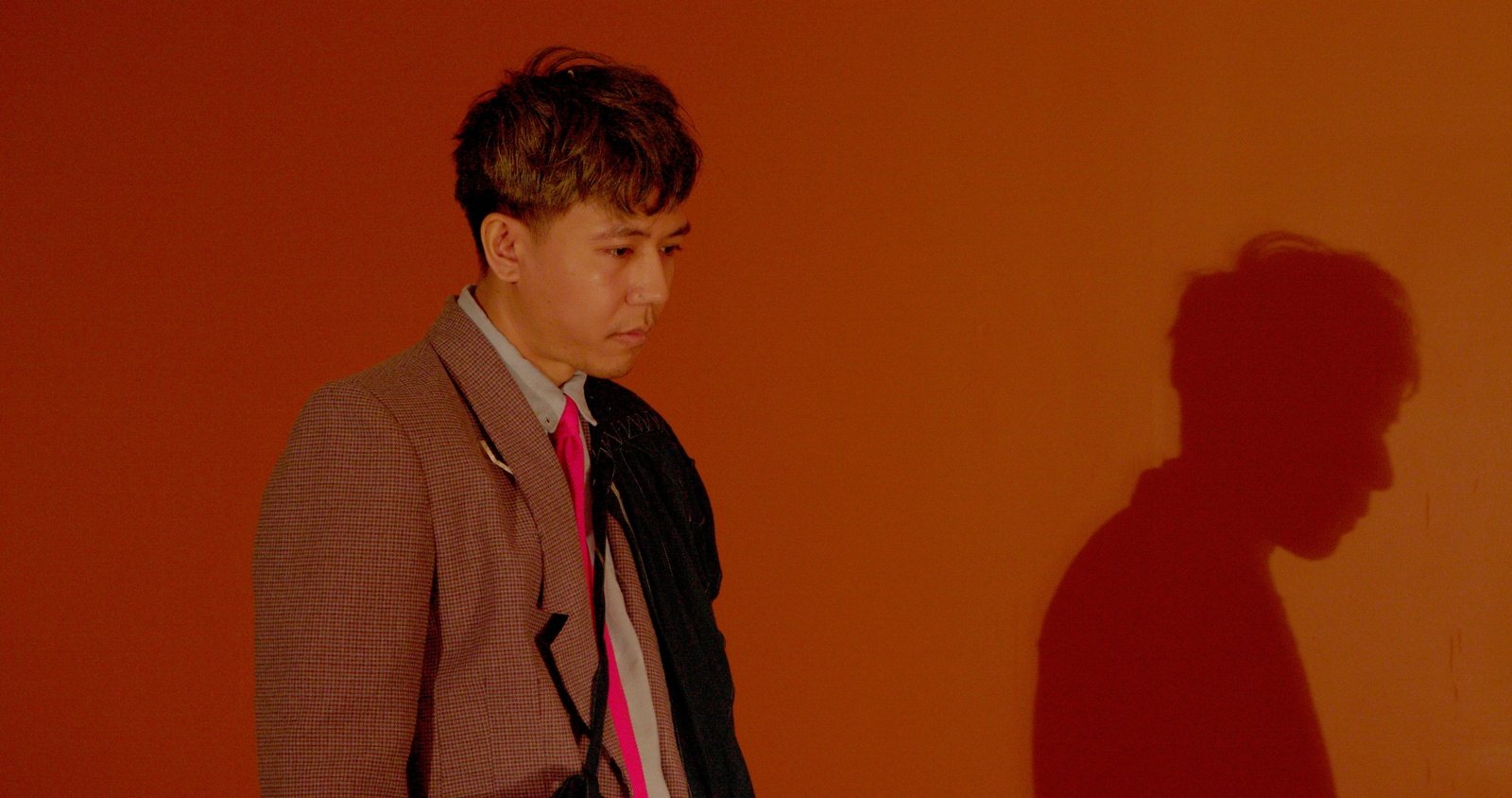
Gangsterism
Isiah Medina, 2025, Canada, 84 min
As he mulls over the budget for his new film, director-gangster Clem sends his artist cronies after an old comrade rumoured to be a leaker.

Cherub (2024)
Devin Shears, 2024, Canada, 74 mins
“Told almost entirely without dialogue, this meditative character study follows Benjamin Turnbull as Harvey, a straight, fat man who discovers an opportunity to build new confidence in himself and his body when he learns about the chub subculture in the LGBTQ community and decides to submit a photograph of himself to a magazine's "Cherub of the Month" contest. “ — Nickel Festival

CookBook LookBook Presents: Spices Double Feature
Screening includes:
Magueyes - Rubén Gámez, 1962, Mexico, 9 min
Yum, Yum, Yum! A Taste of the Cajun and Creole Cooking of Louisiana - Les Blank, Maureen Gosling, 1990, USA, 31 min
Spices move through trade, theft, and travel. Spiciness also catalyzes change on both culinary and cultural levels, and can represent moments/acts of resistance and the individuals who rise to occasions calling for liberation. Join Cookbook Lookbook for spicy installation, a double-feature screening of Magueyes (directed by Ruben Gámez) and Yum, Yum, Yum! A Taste of Cajun and Creole Cooking (directed by Les Blank), followed by casual tableside conversation.
CookBook LookBook is an artist collective that explores storytelling through food. We organize community events and installations across the U.S. with a focus on SPICE this year. In 2023, we were supported by a grant from The Andy Warhol Foundation for the Visual Arts. In 2025, our inaugural publication was acquired by the Watson Library at The Metropolitan Museum of Art in New York.
Melisa Gerecci will attend, along with multimedia offerings from this year's cohort. $8 screening includes popcorn with SPICE bar!
Agenda:
6-6:15pm - Explore the installation
6:15pm - Screening starts
7pm - After-screening conversation and multi-media exploration around the table
Los Magueyes is a Mexican experimental film without humans: agaves are the only protagonists of a cruel and ruthless battle. In this short film, war dialogues with the power of cinematographic representation, and landscape is far more than a passive backdrop.
Yum, Yum, Yum! A Taste of the Cajun and Creole Cooking of Louisiana is a mouth-watering exploration of the cooking and other enthusiasms of French-speaking Louisiana. Features tangy music, and food by Marc Savoy, Paul Prudhomme, and other greats.

Tesoros
W/ English subtitles!
Reflections of Latin American cultural identity through flea markets, among trash and treasures. Unusual, archeological and anti-capitalist universe that explores the sustainability of the circular economy through recycled objects.
Treasures is a documentary directed by Flavia Furtado and created entirely from found objects and filmed with recycled materials over five years in Chile, Brazil, and Argentina. Using a flea-market camera, kaleidoscopic lenses, and video mapping projections on objects, the film builds a unique visual language that transforms discarded materials into portals of memory and imagination.
At its core, Treasures is a story about sustainable development, crafted exclusively with recycled materials sourced from flea markets and street fairs. It addresses urgent social issues such as poverty, aging, the environment, and the legacy of dictatorships in Latin America.
Made by women and members of the LGBTQIA+ community, the film reflects the diverse and resilient realities of Latin America while proposing a new way of seeing cinema, where recycling becomes both an artistic method and a political stance

MICROCINEMA MADNESS: A Spacy Short Film Presentation
Join us on Friday, Dec. 5 as we showcase seven short films from local filmmakers!
Reunion - Kyle Montgomery and Judd Myers
Horse Pills - Arin Spence
Inferno Program - Brevin Berrios
Olivia’s Birdhouse - Alan Michnoff
Subject - Rafael Elorza
Dyeaad - Eugene Hawkins
One More Shot - Eric Miller

88:88
Special 10th anniversary screening!
Isiah Medina, 2015, Canada, 65 min
When one is unable to pay the bills, the electricity is cut. Once one can pay again, the digital appliances flash 88:88. While philosophical systems begin with the concept of nothing as a starting point for thinking, Isiah Medina’s feature debut uses “88:88” as a marker of the nothing (no thing) of poverty and the possibility of counting life anew. Medina’s film cuts together instances in the lives of friends and their experiences in love, science, art, and politics in order to see those lives outside of narrative, and to show that thinking is always both possible and necessary. Praised by philosophers, filmmakers, artists, mathematicians, and audiences around the world, 88:88 celebrates its 10th anniversary this year.

Visual AIDS Day With(out) Art 2025
FREE SCREENING!
In collaboration with Oak Cliff Cultural Center, Visual AIDS Day With(out) Art 2025 is a free screening of a new video program titled "Meet Us Where We're At". This program features six new videos from international artists that highlight the experiences of people who use drugs and the intersection of harm reduction with the ongoing HIV crisis.
The program features new work by Camilo Tapia Flores, Camila Flores-Fernández, Hoàng Thái Anh, Kenneth Idongesit Usoro, José Luis Cortés, and Gustavo Vinagre & Vinicius Couto.
A day of mourning and action that uses art to respond to the ongoing HIV and AIDS crisis, Day With(out) Art encourages museums, universities, museums, and art institutions to present related programming on or around December 1, World AIDS Day. Because AIDS is not over!

The Razor's Edge
Jocelyne Saab, 1985, France / Lebanon, 102 mins
Set amid the Lebanese Civil War, Saab’s fiction feature debut centers the unlikely bond formed between Karim, a forty-something painter, and Samar, a teenager who grew up in war-torn Beirut.
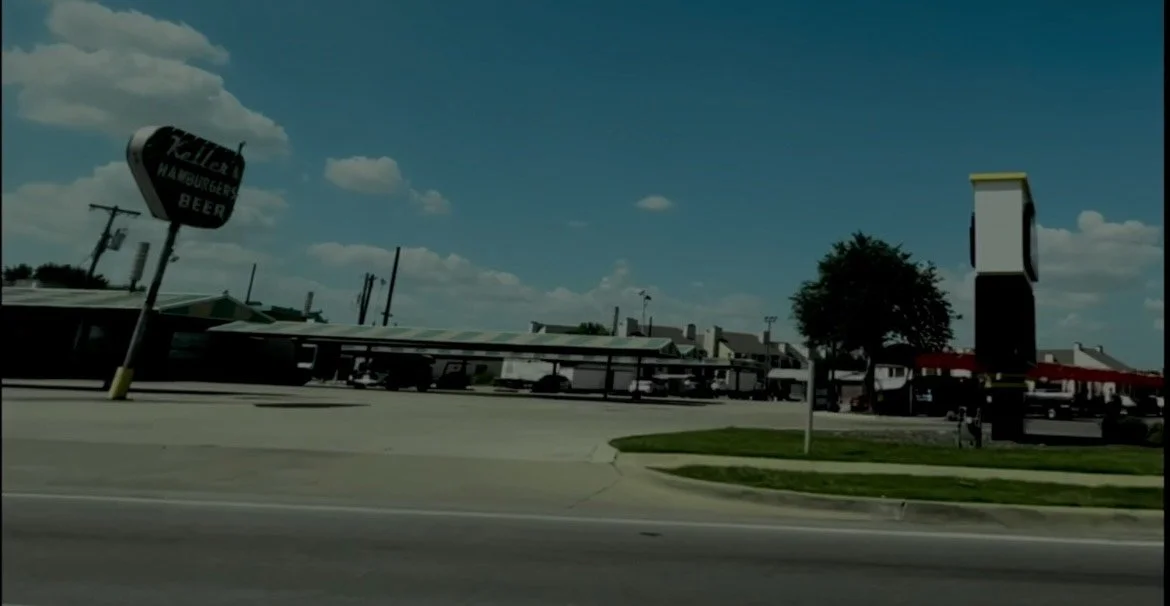
No Car
Madeline Mondell, 2025, USA, 25 min
A shot Run-Gun/ Gorilla Style film that’s a personal look into East Dallas from a born and raised East Dallas local artist with NO CAR. The first $5FLE$H Production. $20 admission ticket!
Schedule/Agenda
1st Screening 7pm-8:30 On Loop
Cross talk and casual viewing encouraged
30 minute intermission
2nd Screening 9-930
No cross talk, full viewing encouraged
Q&A With Directors Madeline Mondell and Fauna Laurel
Live Set from Scarletien 10:15pm

True Stories (additional dates)
True Stories
A double-billed evening on Wednesday, November 19th!
Nature of Things presents a screening of David Byrne’s TRUE STORIES and a ONE NIGHT ONLY exhibition titled “No Jugglers. No Mimes. No Musicians. No Rock Bands.” featuring artwork by Mia Ardito, Harrod Blank, Kristen Cochran, Casey Leone, and Willard “The Texas Kid” Watson!
This story takes place in Virgil, Texas. In fact, it is many stories. Ones you may have read about in the Weekly World News or other supermarket tabloids. And what if they were true? Maybe they are. One character is a country singer desperately seeking matrimony. Another character hasn’t left her bed since we don’t know when. One woman can’t help but lie about everything (she stole a spaceship). And everyone is ready to celebrate the State’s Sesquicentennial, which really does take place in 1986. True Story.
David Byrne, 1986, USA, 89 mins

True Stories (additional dates)
True Stories
A double-billed evening on Wednesday, November 19th!
Nature of Things presents a screening of David Byrne’s TRUE STORIES and a ONE NIGHT ONLY exhibition titled “No Jugglers. No Mimes. No Musicians. No Rock Bands.” featuring artwork by Mia Ardito, Harrod Blank, Kristen Cochran, Casey Leone, and Willard “The Texas Kid” Watson!
This story takes place in Virgil, Texas. In fact, it is many stories. Ones you may have read about in the Weekly World News or other supermarket tabloids. And what if they were true? Maybe they are. One character is a country singer desperately seeking matrimony. Another character hasn’t left her bed since we don’t know when. One woman can’t help but lie about everything (she stole a spaceship). And everyone is ready to celebrate the State’s Sesquicentennial, which really does take place in 1986. True Story.
David Byrne, 1986, USA, 89 mins
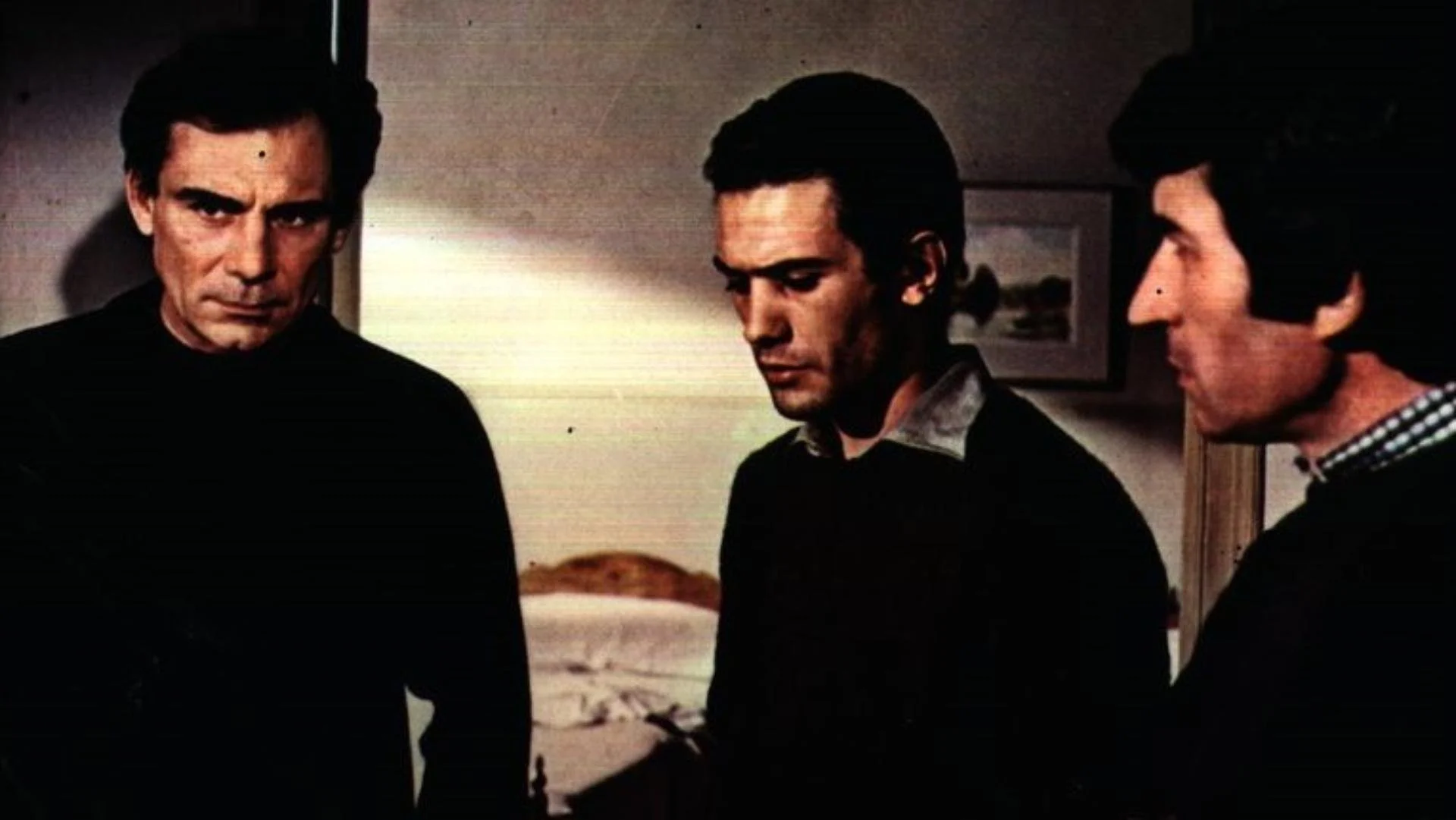
Two By: Operation Ogre
FREE SCREENING!
Gillo Pontecorvo, 1979, Italy/Spain, 101 mins
Spain, 1973. Dictator Francisco Franco has ruled the country since 1939 with an iron fist; but he is now a very old and sick man. The future of the weakened regime is in danger. Admiral Carrero Blanco is his natural successor. The Basque terrorist gang ETA decides that he must die to prevent the dictatorship from continuing.
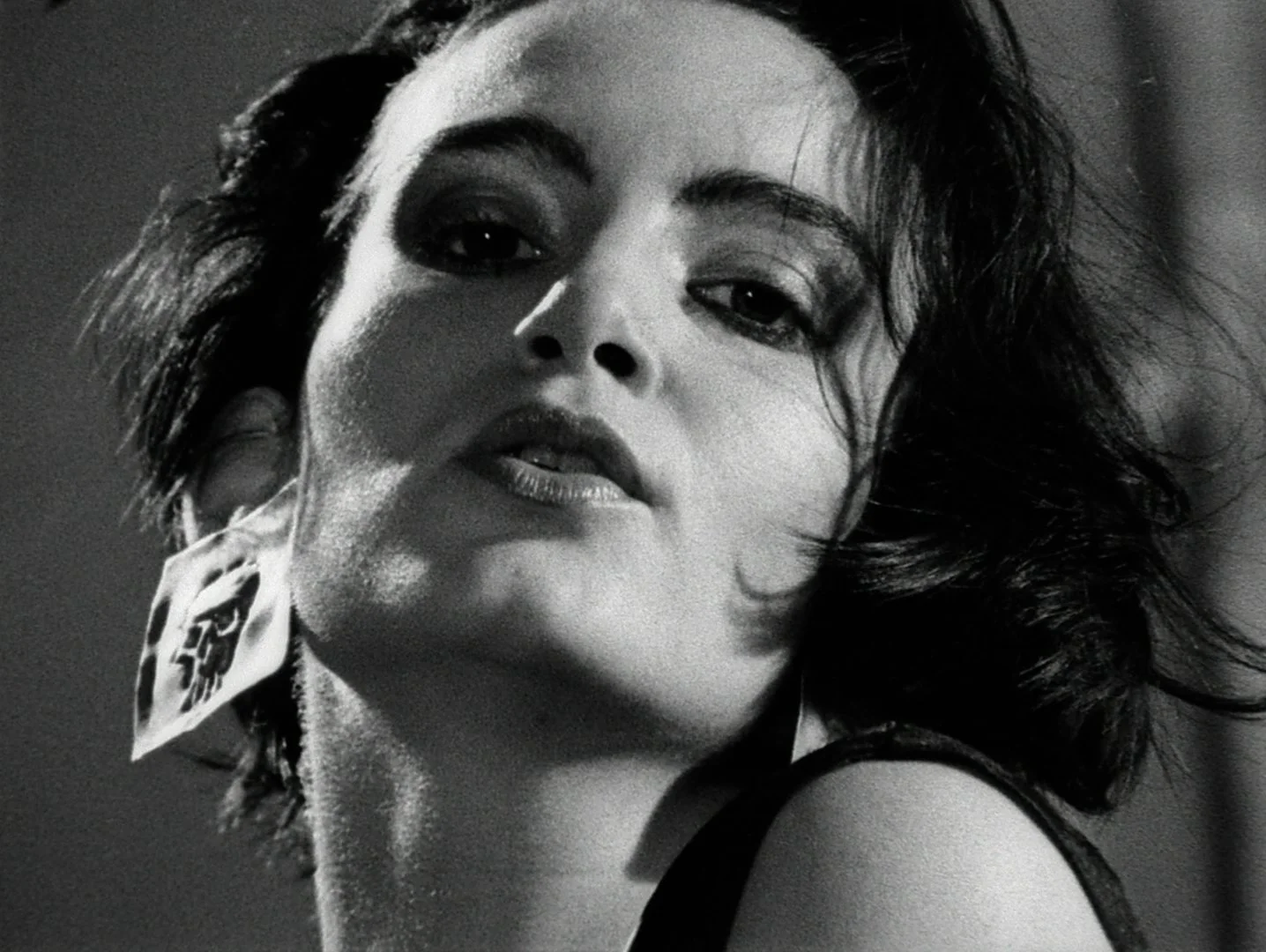
Virgin Machine
Monika Treut, 1988, West Germany, 84 mins
“An unusual search for romantic love”
Dorothee Müller (Ina Blum) is a German journalist researching an article about the nature of romantic love—something she desperately needs, given her dysfunctional relationships with former lover Heinz (Gad Klein) and brother Bruno (Marcelo Uriona). In the Oz of San Francisco, Dorothee finds exactly what she was looking for—and then some—thanks to the help of lesbian strip show barker Susie Sexpert (Susie Bright), drag king Ramona (Shelly Mars), and her mysteriously kinky neighbors (Cleo Dubois and Fakir Musafar). When Dorothy surfaces like a dazzled tourist on the wilder shores of the city’s thriving lesbian community, she has discovered her true sexuality…and left some illusions behind.
Part German Expressionist satire, part sapphic travelogue, Monika Treut’s Virgin Machine (Die Jungfrauenmaschine) is a seminal—and fiercely controversial—work of lesbian cinema.

True Stories (additional dates)
True Stories
A double-billed evening on Wednesday, November 19th!
Nature of Things presents a screening of David Byrne’s TRUE STORIES and a ONE NIGHT ONLY exhibition titled “No Jugglers. No Mimes. No Musicians. No Rock Bands.” featuring artwork by Mia Ardito, Harrod Blank, Kristen Cochran, Casey Leone, and Willard “The Texas Kid” Watson!
This story takes place in Virgil, Texas. In fact, it is many stories. Ones you may have read about in the Weekly World News or other supermarket tabloids. And what if they were true? Maybe they are. One character is a country singer desperately seeking matrimony. Another character hasn’t left her bed since we don’t know when. One woman can’t help but lie about everything (she stole a spaceship). And everyone is ready to celebrate the State’s Sesquicentennial, which really does take place in 1986. True Story.
David Byrne, 1986, USA, 89 mins
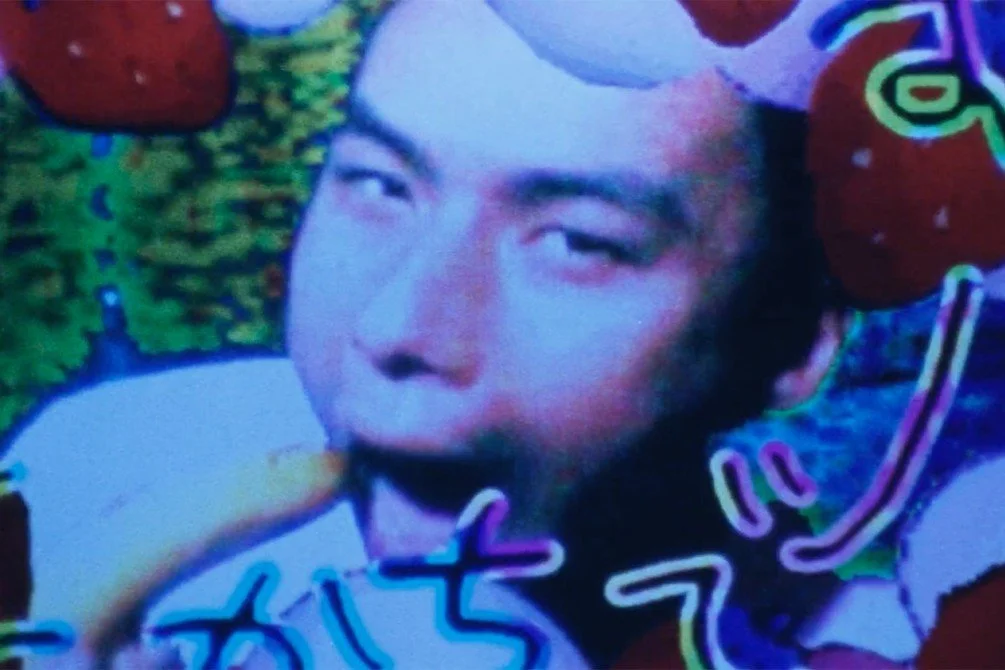
Looking for an Angel (1999)
Akihiro Suzuki, 1999, Japan, 60 mins
Mostly seen on the gay pink circuit and recently restored by its director to its rightful place in the Japanese arthouse canon, Akihiro Suzuki's debut takes the death of a young gay porn performer named Takachi as its starting point. Looking for an Angel follows Shinpei and Reiko as they process their friend’s disappearance, their memories coalescing into a bold exploration of grief set against the backdrop of a nostalgic, blue-hued city shot in a variety of filmic formats. As the viewer begins to piece together Takachi’s story, laden with desire for another boy named Sorao, between the cities of Tokyo and Kochi (“where the boys look like angels”), a powerful free-associative beauty emerges from a unique work described by Suzuki himself as “neither straight, gay, queer, bisexual, asexual or pornographic, but [rather] anti-heterosexist” — a film completely free of dogma and convention.

Seduction: The Cruel Woman
Monika Treut & Elfi Mikesch, 1985, West Germany, 86 mins
“A ticket to a masochistic wonderland…”
Wanda (Mechthild Großmann) is a dominatrix who runs an S/M performance space in Hamburg where she stages elaborate sexual rituals for a discerning audience. Cruelty is her profession, but constructing traps for her lovers—including the lovelorn Gregor (Udo Kier), the naive and innocent Justine (Sheila McLaughlin), and the jaded Caren (Carola Regnier)—is her specialty. All know the rules of the game, but not all are willing to play their roles—but the show must go on…
Inspired by the writings of the Baron Leopold von Sacher-Masoch, Monika Treut and Elfi Mikesch’s Seduction: The Cruel Woman (Verführung: Die grausame Frau) is a coolly sensual tribute to masochism and obsession in all of its forms, and a seminal work of lesbian cinema.
“Sex may just be a passing fad. The age of tenderness is over. What is being presented: the world of sadomasochistic symbols, the rhythm of suffering, the pleasure of torment.”
- Treut/Mikesch
“This is S/M by Avedon, outfits by Dior.” - Film Comment

Looking for an Angel (1999)
Akihiro Suzuki, 1999, Japan, 60 mins
Mostly seen on the gay pink circuit and recently restored by its director to its rightful place in the Japanese arthouse canon, Akihiro Suzuki's debut takes the death of a young gay porn performer named Takachi as its starting point. Looking for an Angel follows Shinpei and Reiko as they process their friend’s disappearance, their memories coalescing into a bold exploration of grief set against the backdrop of a nostalgic, blue-hued city shot in a variety of filmic formats. As the viewer begins to piece together Takachi’s story, laden with desire for another boy named Sorao, between the cities of Tokyo and Kochi (“where the boys look like angels”), a powerful free-associative beauty emerges from a unique work described by Suzuki himself as “neither straight, gay, queer, bisexual, asexual or pornographic, but [rather] anti-heterosexist” — a film completely free of dogma and convention.
